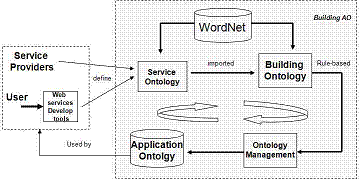Ontos,
Re Doug Foxvog et al’s
paper at
http://www.vitvar.com/doc/WI2007-WangVHF.pdf ,
The definition of an ontology, which the
authors adapted from Karlsruhe
(see the paper) :
An
ontology with data types is a structure
O := (C;·C;
T;R; ¾R;·R;
A; I), consisting of
a set of concepts C
aligned in a hierarchy·C,
a set of relations R
with ·R,
the signature ¾R : R ! C £ C,
a set of datatypes T
with type transition functions,
a set of attributes A
and instances I,
and the signature ¾A : A ! C £ T.
For
a relation r 2 R,
we define its domain and its range by
dom(r) := ¼1(¾R(r))
and
range(r) := ¼2(¾R(r)).
Then
they added metadata to describe types of relations in terms of symmetric,
reflexive, etc.
This
definition is extended by four concept relations with
fuzzy
weights, see Section 5.2.
and
then they reach a conclusion that defining “similarity” between two
ontologies is still too tough for the paper to tackle …
For
measuring of ontology similarity sim(O1;O2) 2
[0; 1],
we
consider concepts, concept relations, types and attributes. The concept
instance similarity is out of this paper.
This could give us a starting point about
how to interface two ontologies, if anyone is interested in this topic.
-Rich
Sincerely,
Rich Cooper
EnglishLogicKernel.com
Rich AT EnglishLogicKernel DOT com
From:
ontolog-forum-bounces@xxxxxxxxxxxxxxxx
[mailto:ontolog-forum-bounces@xxxxxxxxxxxxxxxx] On Behalf Of Rich Cooper
Sent: Saturday, February 13, 2010 10:23
AM
To: '[ontolog-forum] '
Subject: Re: [ontolog-forum]
Merging Service Ontologies to form ApplicationOntologies
That paper below was written by Doug
Foxvog (of this list) among others; it has an interesting overview algorithm
section around the third page or so:
6.
Building Application Ontologies
In
order to build meaningful a (AO),
a knowledge base,
a
thesaurus or dictionary is necessary. WordNet is a quite
mature
conceptual thesaurus with hierarchally structured
organisation
and multiple semantic relations between concepts.
It
is a good choice also due to its broad concept structure
of
synonym sets.
6.1
Process of Building (AO)
We
assume there are k
semantic services from the same
application
domain as the inputs of (AO) builder.
As depicted
in
Fig. 4, the building process is iterative including
following
steps.
1.
Initialize AO0 as
an empty set, ;.
2.
Import a SOi; 1 · i · k; re-organise it into
the ontology
[ my note: 1 <=
i <= k ]
structure
defined by Definition 1.
3.
For each concept of SOi, extract its relative
concept
information
from WordNet by the WCEA
algorithm of
Section
6.2; add the retrieved information to SOi, then
get
a new SO0i with more concept
relations.
4.
Merge SO0i and AOi¡1 using
the WOMA
algorithm
defined
in Section 6.3 to obtain a new AOi.
5.
Manage AOi,
including cleaning concept conflicts,
updating
and storing (see Section 6.4).
6.
Repeat steps 2 to 5, until i = k, then stop.
The
output of this process is an application ontology AOk,
which
can be referred to by other service providers or users
to
create new applications as depicted in Fig. 4.

This algorithm seems like a very useful
place to start from if the list wants to consider how ontologies might be
merged in daily practice.
-Rich
Sincerely,
Rich Cooper
EnglishLogicKernel.com
Rich AT EnglishLogicKernel DOT com
